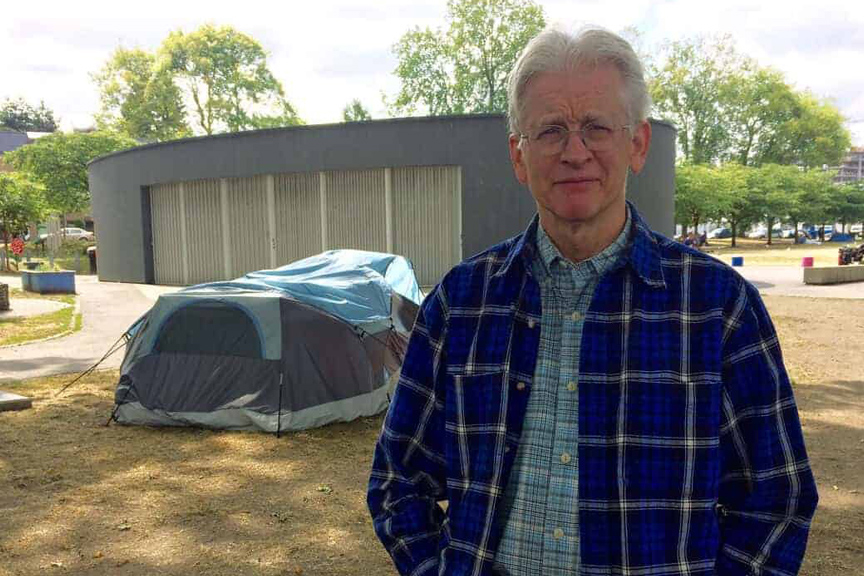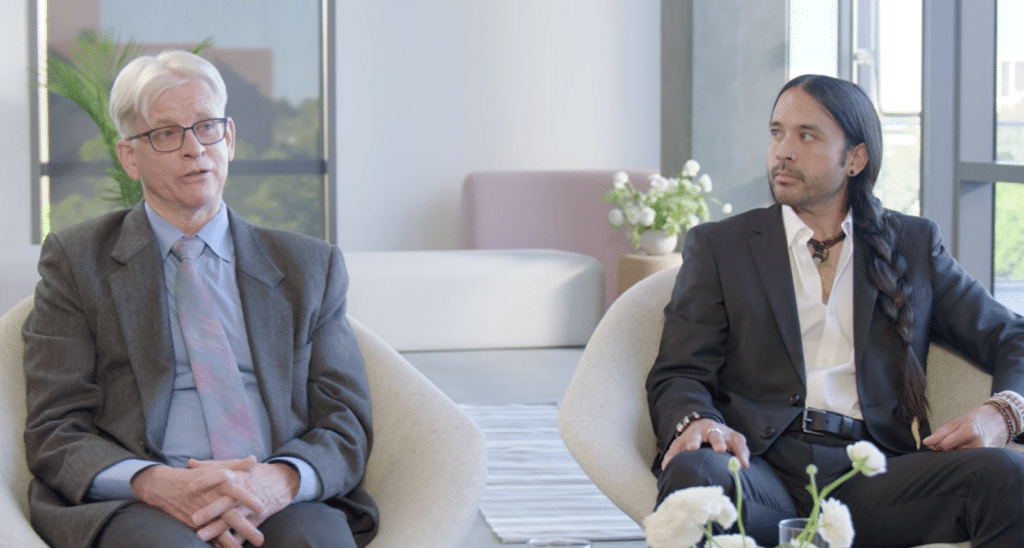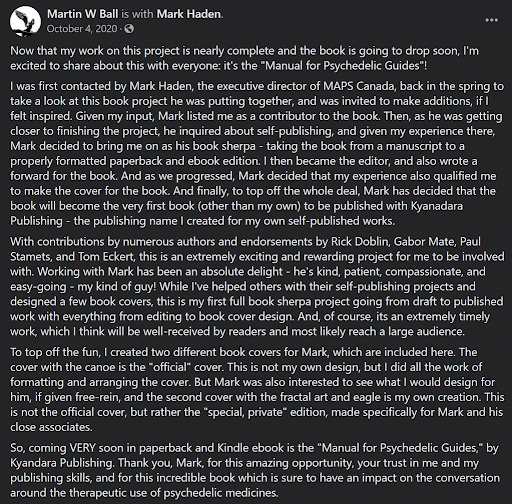After a Year of Controversy, MAPS Canada Executive Director Mark Haden Announces Resignation
During a Psymposia investigation into the alarming 5-MeO-DMT practices of Dr. Martin Ball—who is the editor and publisher of Mark Haden’s recent “Manual for Psychedelic Guides”—Haden announced his resignation from MAPS Canada.

Psymposia is a 501(c)(3) nonprofit research and media organization that offers critical perspectives on drugs, politics, and culture. We rely on contributions from our readers and listeners. Your support is vital to sustaining Psymposia.
Support Psymposia’s independent journalism on Patreon and help us drive the Mystery Machine! We’re a bunch of meddling kids who are unmasking the latest shenanigans on the psychedelics beat.
On February 10, 2021, Mark Haden—Executive Director of the Canadian arm of the Multidisciplinary Association for Psychedelic Studies (MAPS Canada)—announced his resignation.
This resignation came on the heels of a year full of criticisms of Haden and MAPS Canada.
Starting in January 2020, Haden was criticized for his appearance as the first interview on Netflix’s “The Goop Lab” (an extension of Gwyneth Paltrow’s Goop brand, which has been sued by California district attorneys over expensive, unproven “health” products).
Following the “Goop Lab” appearance, reporting surfaced in March 2020 that MAPS Canada misrepresented the credentials of an unlicensed therapist who is alleged to have sexually abused a participant in a MAPS clinical trial for MDMA-assisted psychotherapy.
In October 2020, Psymposia published an open letter written by two MAPS Canada volunteers identifying racist and prejudicial behavior they experienced while volunteering for the organization. MAPS Canada subsequently announced that volunteers would be required to sign a non-disclosure agreement for the purpose of “protecting the privacy and security of our organization and the members that compose it.”
And most recently, Psymposia began an investigation into Haden’s “Manual for Psychedelic Guides,” for which Haden brought on Dr. Martin Ball to write the foreword, in addition to serving as editor and publisher. Psymposia recently came across Ball’s accounts of vomiting on clients under the influence of 5-MeO-DMT; shoving his thumbs down clients’ throats; touching clients’ genitals because, Ball insists, “that’s what they need” for spiritual and/or therapeutic reasons; dismissing the intergenerational trauma of a Jewish client; and—in one instance—putting his tongue into an unresponsive elderly woman’s mouth during a session.

The resignation was made public while Psymposia was in communication with Haden via email regarding his work with Ball.
MAPS Executive Director Rick Doblin told Psymposia that there is “absolutely no connection” between Haden’s resignation and Psymposia bringing Ball’s statements to MAPS’ attention.
“[Haden] announced his resignation to the MAPS Canada Board last week, well before you wrote me about Dr. Ball,” Doblin said, continuing that Haden’s leadership will be missed.
Doblin said he has nothing to say about Ball’s behavior or work with Haden.

Haden claimed not to have been aware of Ball’s public statements or practices as a psychedelic practitioner. He said that he does not “promote or even discuss Dr Ball [sic] work.” Haden then asked if Psymposia had read the section of his book on “who should NOT be a guide.” This section lists disqualifying criteria such as “Great Therapist Syndrome,” “Predator,” “Over-bonding Problems,” and “Trauma Projection.”
Psymposia sent Haden a video of Ball (with timestamps to the statements in question) and asked whether—using his own criteria as a lens to analyze Ball’s practices—Haden thought that Ball was qualified to be a psychedelic guide. In response, Haden said, “I don’t know Dr Balls [sic] work and therefore can’t comment.” This raises further questions as to why Haden brought on Ball to edit, publish, and write the foreword to a book that MAPS Canada recommends as a foundational resource for “[p]sychiatrists, psychologists, therapists and shamans.”
When emailed about his behavior as a psychedelic guide, Ball defended his “therapeutic” tactics, telling Psymposia that all of the clients he vomited on, put fingers in the throats of, or touched the genitals of thanked him and usually came back for more sessions. He was not willing to put Psymposia in touch with any of these clients, stating that he had lost touch with most of them.
When asked about putting his tongue into an unresponsive client’s mouth, Ball responded, “The client was a 79 year old woman. She didn’t appear to be breathing, her mouth was agape, and instinctively in that moment, what felt right was to gently put the tip of my tongue on the tip of hers. I put a little bit of pressure on it and breathed into her. As soon as she responded and began breathing again, I removed myself. After this session, she came back to me on two subsequent occasions and there were no further issues.”
It’s worth noting that the account above differs from Ball’s earlier public recounting of this incident at a Los Angeles Medicinal Plants Society (LAMPS) event:
“She wasn’t breathing and she was just lying there,” Ball said. “What happened was I ended up lying down on top of her…so I put my tongue in her mouth and I pushed against her tongue and there was no push back and I was like, ‘Okay, you know, this is, this is serious.’ And so then I just waited with my tongue up against the tip of her tongue and after a while she suddenly pushed my tongue out of her mouth. I was like, ‘Okay she’s going to be fine.’”
Whether or not this woman received medical advice between sessions is unclear.
Ball—whose doctoral qualifications are in Religious Studies, not medicine or psychology—told Psymposia he has “no emergency medical training, nor did I have any medical staff on hand.” He said that, in this case, he believed calling emergency services would have been “overkill and a gross overreaction,” because the unresponsive woman responded to his intervention within “maybe two minutes.”
In his lecture with LAMPS, though, Ball seemed aware of the gravity of the situation. He stated that this session was the closest a client of his had come to actually dying—or, as he put it, seeming like they were “really just gonna go.” He went on to acknowledge that he thinks there is “always that potential” in the work he does.
“When people really go deep,” Ball said. “It is very common for people to stop breathing for short periods of time. So, there is the potential that someone might not start to breathe again.”
Ball said that “these are all examples of specific events that happened within a specific therapeutic methodology that I developed and enacted that is fundamentally different than what one might find elsewhere.”
Ball told Psymposia that “based on this talk, the organizers at LAMPS decided that they wanted to make a documentary about my technique and approach.” The documentary project was never completed after failing to raise sufficient funds.
The organizers of the LAMPS event who wanted to make the documentary—Brad Adams and Paul Lisy—confirmed this, and told Psymposia that the video of Ball is the most viewed piece of content on their YouTube channel “and almost [all] of the comments are glowing.”
Adams and Lisy defended their decision to host Ball, stating that Ball “had already announced, and reiterated in his LAMPS talk, that he was retired and discussing his practices in the past tense…. Considering that he was speaking in the past tense, and that the bulk of his work (he was completing a fifth book shortly after giving his talk) was presented in a studious manner, we judged him to be in no way a threat or danger to others.” They also noted that Adams removed Ball from a panel at a 2018 conference after Ball spoke out defending Octavio Rettig—a serially abusive 5-MeO-DMT practitioner.
In a message to Psymposia, a professional associate of Brad Adams’ expressed dismay that multiple leaders in the LA psychedelic community were downplaying Ball’s practices. The associate of Adams’, who asked to remain anonymous, was unsettled by people complaining that Psymposia’s coverage of Ball’s violations was more abusive than the violations themselves: “This is a shocking level of complicity. They actually wrote they would be willing to film potential sexual abuse in a ceremonial setting so that it could be ‘judged.’ … I care so deeply about this movement. And if this is what we are, we are screwed. It’s got to be better than this.”
Ball claimed that none of his particular methodologies appear in Haden’s book. And, while this may be true, Haden’s book does encourage questionable techniques such as “cuddling a participant.” If patients feel embarrassed about this cuddling in retrospect, the book encourages therapists to “explain how this is part of the healing experience and is not a sexual process.”
Psymposia Arts and Gender Editor and sexual violence researcher, Dr. Lily Kay Ross, said that this language of embarrassment minimizes a patient’s possible accounts of harm:
“Were a therapist to follow Haden’s advice, their dismissive explanation would reinforce power dynamics and undermine the patient’s perception of their own experience,” Ross said. “It shows Haden’s willingness to erase the history of sexual violence by psychedelic practitioners. He seems to be providing a pre-fabricated response which advances the therapist’s interests at the expense of the client.”
Neither Haden nor Doblin offered any criticism of Ball’s “therapeutic” practices: his admitted touching of clients’ genitalia, his vomiting on clients, or his forcing his thumbs down their throats. Nor would they comment as to whether MAPS has an official position on cuddling in the context of psychedelic-assisted psychotherapy, or whether Haden’s book was being recommended to participants in MAPS’ MDMA therapist training.
Moving on from his position at MAPS Canada, Haden will continue working in the psychedelic pharmaceutical space as a Clinical Research Advisor for psychedelic drug manufacturer, Psygen.
According to Doblin, there will be a several-month recruitment and review process before a new Executive Director is selected for MAPS Canada.
Hey! Before you go… Psymposia is a 501(c)(3) non-profit media organization that offers critical perspectives on drugs, politics, and culture. We strive to ask challenging questions, and we’re committed to independent reporting, critical analysis, and holding those who wield power accountable.
Our perspectives are informed by critical analysis of the systemic crises of capitalism that have directly contributed to the unmitigated growth of addiction, depression, suicide, and the unraveling of our social relations. The same economic elite and powerful corporate interests who have profited from causing these problems are now proposing “solutions”—solutions which both line their pockets and mask the necessity of structural change.
In order for us to keep unpacking these issues and informing our audience, we need your continuing support. You can sustain Psymposia by becoming a supporter for as little as $2 a month.





